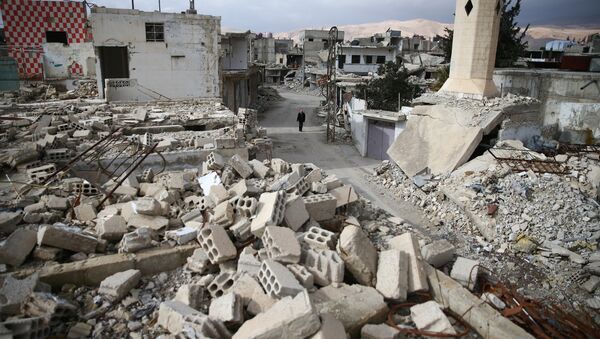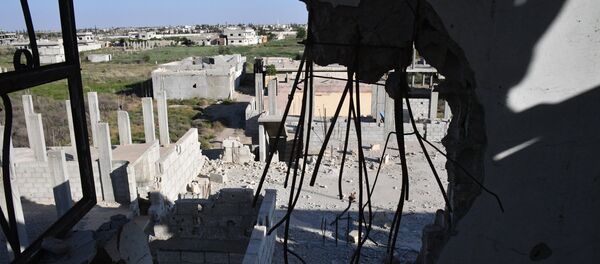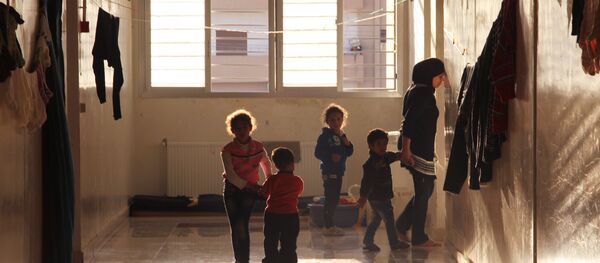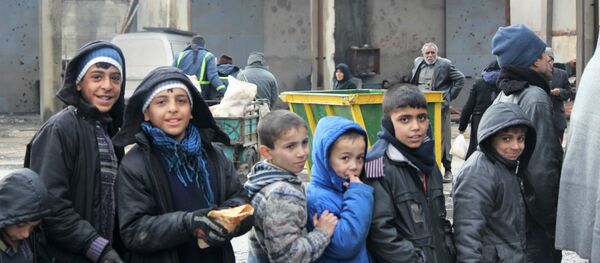GENEVA (Sputnik) — Amid the deteriorating humanitarian situation in Syria's Eastern Ghouta, where one of the four Syrian de-escalation zones is located, humanitarian organizations could not confirm media reports of mass starvation, while Russia has suggested there is an anti-Damascus media campaign going on similar to the one done during the eastern Aleppo offensive.
Western and Arab media have been releasing images of dying children, claiming that the responsibility lies with the Syrian army who was intentionally starving 400,000 local residents. Humanitarian agencies noted worsening food conditions in this area without confirming that local residents were suffering from mass starvation.
In addition, Moscow has repeatedly called on the West to assist the Syrian people, since Russia is still the only country proactively involved in talks on humanitarian convoys and medical evacuation with the regional authorities. According to the Russian Defense Ministry, the Eastern Ghouta de-escalation zone has the highest concentration of communities in urgent need of humanitarian aid.
Worsening Conditions
On Monday, a number of Arab and Western media outlets published a photo of little Sahar, a 34-day-old girl who had died from acute malnutrition in Eastern Ghouta. The image was said to be provided by local doctors.
DISCLAIMER: This image may hurt your feelings.
This is a pic of a little girl from #Eastern #Ghouta, starving 2 death
— Mahmoud Rashwani (@MahmoudRashwani) 22 октября 2017 г.
Make this not another secret that dies n history#AssadBesiegesGhouta pic.twitter.com/JjTZHtqVmQ
In an answer to a Sputnik inquiry, the World Health Organization (WHO) confirmed reports of two infants, 45 and 34 days old, dying from malnutrition. According to WHO data, there was a growing number of "areas where the level of acute malnutrition is increasing given the challenges the communities have been facing" in Eastern Ghouta, with starvation reported in a number of cases.
Since the beginning of 2017, the organization delivered to doctors working in Eastern Ghouta sufficient quantities of ready-to-use therapeutic formulas to treat infants suffering from acute malnutrition, Jasarevic added, noting that more supplies are expected to arrive with the next convoy.
The International Committee of the Red Cross (ICRC) working in Eastern Ghouta did not confirm to Sputnik the reports about mass starvation, saying the claims are being checked. ICRC spokeswoman Iolanda Jaquemet, however, noted the deteriorating food situation in Eastern Ghouta.
"Our sources inside this area have informed us that the situation is getting worse. We know from past experience that such situations, where the population depends on the provision of humanitarian aid for its very basic needs, can deteriorate very quickly, and reach tragic proportions," Jaquemet said.
According to ICRC, some 400,000 people currently live in Eastern Ghouta, and they all need stable humanitarian aid deliveries.
Second East Aleppo?
Russia claims that reports on the threat of child famine in Eastern Ghouta are exaggerated and are reminiscent of the situation in eastern Aleppo, were warehouses were discovered after the city was liberated from opposition forces, filled with humanitarian aid and medical supplies.
Eastern Ghouta is one of the four de-escalation zones in Syria, created under an agreement signed in Astana on September 15, 2017. Under the document, Russian military police monitors the situation in the region. The opposition Al-Rahman Legion and Jaysh Islam groups currently operate in the area alongside al-Nusra Front that was rebranded as Jabhat Fatah al Sham (a terrorist group, banned in Russia) after being expelled from east Aleppo.
"News reports on the threat of famine among children in Eastern Ghouta are all part of information warfare. These are fake news coming from those who have never been to Damascus and have long lost any contact with reality. We remember similar reports about eastern Aleppo, and we also remember that after its liberation warehouses filled with food supplies were discovered there. The same is now happening in Eastern Ghouta," a Russian diplomatic source told Sputnik.
The diplomat pointed to images of militants from Eastern Ghouta "who do not show any signs of being undernourished," noting that they could be using the same food rationing system as in Aleppo.
"We hope that in this situation, the United Nations will act in an impartial and neutral manner, refraining from joining this unscrupulous campaign led by a number of Western and Arab media," the source said.
The source went on to say that Russia was the only country working with local authorities to ease the suffering of the people in Eastern Ghouta by negotiating humanitarian convoys and medical evacuations.
Particularly, in early September 2017 Russia’s Defense Minister Sergei Shoigu urged the ICRC to take urgent steps to send more humanitarian aid to Syria. The Defense Ministry’s website features a list, updated on an ongoing basis, of settlements in desperate need of assistance and restoration of residential housing, destroyed by terrorists. According to this document, most of the cities and villages that need urgent aid are in the Eastern Ghouta de-escalation zone, where there are 27 settlements of this kind.
The last joint humanitarian 42-truck convoy formed by the United Nations, ICRC and the Syrian Arab Red Crescent (SARC) left for Eastern Ghouta on September 23, delivering food, clothing and medical supplies to a population of 25,000 people in Mesraba, Modira and eastern Harasta. Another joint convoy reached 90,000 people in Duma on August 17. Sources told Sputnik that the delay in the delivery of a new UN humanitarian convoy to Eastern Ghouta was due to the fact that UN humanitarian agencies have been focusing on helping Raqqa residents to the detriment of people in other parts of Syria.







